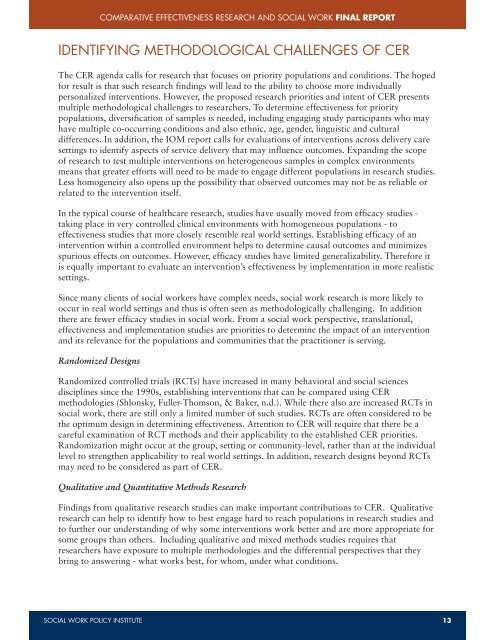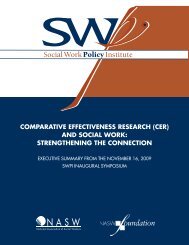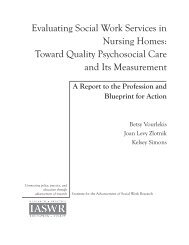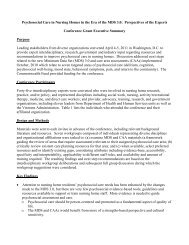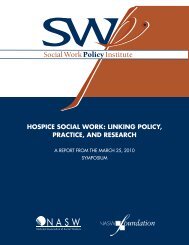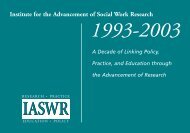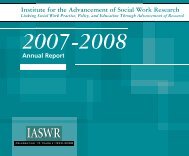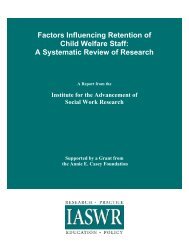Final Report - Social Work Policy Institute
Final Report - Social Work Policy Institute
Final Report - Social Work Policy Institute
You also want an ePaper? Increase the reach of your titles
YUMPU automatically turns print PDFs into web optimized ePapers that Google loves.
COMPARATIVE EFFECTIVENESS RESEARCH AND SOCIAL WORK FINAL REPORTIDENTIFYING METHODOLOGICAL CHALLENGES OF CERThe CER agenda calls for research that focuses on priority populations and conditions. The hopedfor result is that such research findings will lead to the ability to choose more individuallypersonalized interventions. However, the proposed research priorities and intent of CER presentsmultiple methodological challenges to researchers. To determine effectiveness for prioritypopulations, diversification of samples is needed, including engaging study participants who mayhave multiple co-occurring conditions and also ethnic, age, gender, linguistic and culturaldifferences. In addition, the IOM report calls for evaluations of interventions across delivery caresettings to identify aspects of service delivery that may influence outcomes. Expanding the scopeof research to test multiple interventions on heterogeneous samples in complex environmentsmeans that greater efforts will need to be made to engage different populations in research studies.Less homogeneity also opens up the possibility that observed outcomes may not be as reliable orrelated to the intervention itself.In the typical course of healthcare research, studies have usually moved from efficacy studies -taking place in very controlled clinical environments with homogeneous populations - toeffectiveness studies that more closely resemble real world settings. Establishing efficacy of anintervention within a controlled environment helps to determine causal outcomes and minimizesspurious effects on outcomes. However, efficacy studies have limited generalizability. Therefore itis equally important to evaluate an intervention’s effectiveness by implementation in more realisticsettings.Since many clients of social workers have complex needs, social work research is more likely tooccur in real world settings and thus is often seen as methodologically challenging. In additionthere are fewer efficacy studies in social work. From a social work perspective, translational,effectiveness and implementation studies are priorities to determine the impact of an interventionand its relevance for the populations and communities that the practitioner is serving.Randomized DesignsRandomized controlled trials (RCTs) have increased in many behavioral and social sciencesdisciplines since the 1990s, establishing interventions that can be compared using CERmethodologies (Shlonsky, Fuller-Thomson, & Baker, n.d.). While there also are increased RCTs insocial work, there are still only a limited number of such studies. RCTs are often considered to bethe optimum design in determining effectiveness. Attention to CER will require that there be acareful examination of RCT methods and their applicability to the established CER priorities.Randomization might occur at the group, setting or community-level, rather than at the individuallevel to strengthen applicability to real world settings. In addition, research designs beyond RCTsmay need to be considered as part of CER.Qualitative and Quantitative Methods ResearchFindings from qualitative research studies can make important contributions to CER. Qualitativeresearch can help to identify how to best engage hard to reach populations in research studies andto further our understanding of why some interventions work better and are more appropriate forsome groups than others. Including qualitative and mixed methods studies requires thatresearchers have exposure to multiple methodologies and the differential perspectives that theybring to answering - what works best, for whom, under what conditions.SOCIAL WORK POLICY INSTITUTE 13


